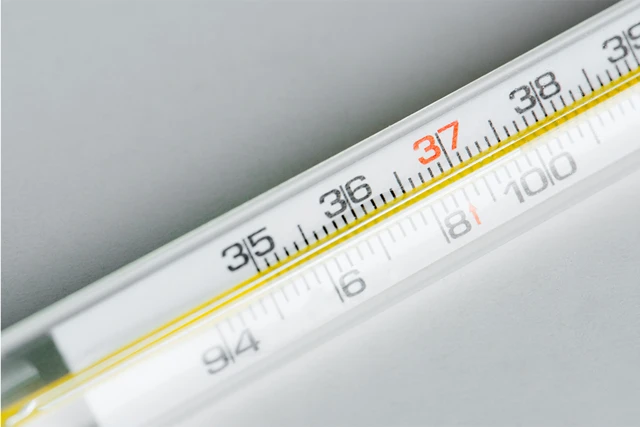Understanding what is normal and what might be a cause for concern is essential for the health of both the mother and the baby. This article will dive into the importance of body temperature in early pregnancy, how to monitor it, the expected changes, and when to seek medical advice.
Basal Body Temperature During Early Pregnancy
1. What is basal body temperature (BBT)?
Basal body temperature (BBT) is your body’s temperature at rest. It is usually measured in the early morning before getting out of bed. For women trying to conceive, tracking BBT can provide valuable information about ovulation cycles.
In the first trimester, BBT typically rises slightly due to hormonal changes—specifically, an increase in progesterone levels. Understanding these temperature changes is key to recognizing early signs of pregnancy.
2. Normal body temperature during early pregnancy
In the early stages of pregnancy, a woman’s body temperature often rises slightly. The average body temperature of a pregnant woman may range from 36.4°C to 37.5°C. This increase is mainly due to elevated levels of progesterone, which are necessary to maintain the uterine lining and support the baby’s development.
2.1. Why does body temperature increase?
When progesterone levels rise during the luteal phase and early pregnancy, they cause a slight increase in body temperature. This hormone is crucial for creating a suitable environment for embryo implantation and development. A slight rise in body temperature is a natural and healthy part of early pregnancy.
2.2. How long does the temperature stay elevated?
This increase in body temperature typically lasts throughout the first trimester as progesterone levels continue to rise. By the second trimester, body temperature may begin to stabilize as hormone levels begin to balance out.
Basal Body Temperature During Early Pregnancy
3. How to monitor body temperature during early pregnancy
Tracking body temperature in early pregnancy can help monitor the progress of the pregnancy and ensure everything is proceeding normally. Here are some methods expectant mothers can use:
3.1. Using a basal thermometer
A basal thermometer is more sensitive than a regular thermometer and can detect small changes in body temperature. To obtain accurate results, it’s important to measure your temperature at the same time every morning before getting out of bed.
3.2. Tracking temperature with an app
There are many apps available that can help you track your basal body temperature over time. These apps allow you to record daily temperatures and observe trends that may indicate pregnancy or other reproductive health conditions.
3.3. Understanding how to read temperature charts
Knowing how to read a temperature chart is crucial. A continuous rise in temperature for more than 18 days may be an early sign of pregnancy. On the other hand, a sudden drop in temperature could indicate potential issues that require medical attention.
Basal Body Temperature During Early Pregnancy
4. What temperature is considered too high during early pregnancy?
While a slight increase in body temperature is normal, a significantly high temperature may be cause for concern. Fever during early pregnancy can pose risks to both the mother and the baby.
- Identifying a fever: A body temperature above 38°C is generally considered a fever. If you experience this, it is important to monitor it closely and consult your doctor.
- Potential risks of high fever: High fever in early pregnancy may signal an infection or other medical conditions that could harm the baby. Conditions such as viral infections, bacterial infections, or even heatstroke can lead to elevated body temperature.
- When to seek medical advice: If you have a high fever, chills, or feel unwell during early pregnancy, it is important to contact your doctor immediately. Early intervention can prevent complications and ensure the safety of both mother and baby.
5. Tips for maintaining a healthy body temperature during pregnancy
Keeping a healthy body temperature is essential to ensure the well-being of both the mother and the developing baby. Here are some tips for regulating body temperature:
- Stay hydrated: Drinking plenty of water helps regulate body temperature and prevents dehydration, which can lead to increased body heat.
- Wear appropriate clothing: Choose loose, breathable clothing, especially in warm climates, to help the body naturally release heat.
- Avoid overheating: Be cautious with activities that may raise body temperature, such as hot baths, saunas, or high-intensity exercise. It's important to stay cool and avoid environments that may cause overheating.
- Rest when needed: Fatigue can lead to a rise in body temperature. Take breaks regularly and listen to your body’s needs.

Basal Body Temperature During Early Pregnancy
6. The impact of body temperature on the fetus
The fetus is very sensitive to changes in the mother's body temperature. While a slight increase in body temperature is usually harmless, prolonged high temperatures can negatively affect fetal development.
- Risk of neural tube defects: Exposure to high body temperatures during early pregnancy has been associated with an increased risk of neural tube defects, such as spina bifida. This risk highlights the importance of managing fevers and avoiding overheating in early pregnancy.
- Potential impact on fetal development: Prolonged high body temperatures can interfere with the baby’s normal growth and development. It’s important to monitor your temperature and address any significant increases in a timely manner.
Conclusion
Monitoring and managing body temperature during the early stages of pregnancy is crucial to ensure the health and well-being of both mother and baby. By understanding what is normal and what may indicate a problem, pregnant women can take proactive steps to protect their health and their baby’s development.
Always consult your doctor if you have any concerns about body temperature or other symptoms during pregnancy.
Website: https://wilimedia.co
Fanpage: https://www.facebook.com/wilimediaen
Email: support@wilimedia.co
